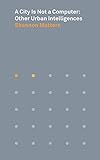A city Is not a computer : other urban intelligences / Shannon Mattern.
By: Mattern, Shannon Christine [author.] .
.
Material type:  BookSeries: Places books: 2.Publisher: Princeton, New Jersey : Princeton University Press, [2021]Description: 1 online resource (x, 187 pages) : illustrations, maps.Content type: text Media type: computer Carrier type: online resourceISBN: 069122675X; 9780691226750.Subject(s): Urban renewal
BookSeries: Places books: 2.Publisher: Princeton, New Jersey : Princeton University Press, [2021]Description: 1 online resource (x, 187 pages) : illustrations, maps.Content type: text Media type: computer Carrier type: online resourceISBN: 069122675X; 9780691226750.Subject(s): Urban renewalIncludes bibliographical references and index.
Introduction Cities, Trees & Algorithms -- 1. City Console -- 2. A City Is Not a Computer -- 3. Public Knowledge -- 4. Maintenance Codes -- Conclusion Platforms, Grafts & Arboreal Intelligence.
A bold reassessment of "smart cities" that reveals what is lost when we conceive of our urban spaces as computers Computational models of urbanism--smart cities that use data-driven planning and algorithmic administration--promise to deliver new urban efficiencies and conveniences. Yet these models limit our understanding of what we can know about a city. A City Is Not a Computer reveals how cities encompass myriad forms of local and indigenous intelligences and knowledge institutions, arguing that these resources are a vital supplement and corrective to increasingly prevalent algorithmic models. Shannon Mattern begins by examining the ethical and ontological implications of urban technologies and computational models, discussing how they shape and in many cases profoundly limit our engagement with cities. She looks at the methods and underlying assumptions of data-driven urbanism, and demonstrates how the "city-as-computer" metaphor, which undergirds much of today's urban policy and design, reduces place-based knowledge to information processing. Mattern then imagines how we might sustain institutions and infrastructures that constitute more diverse, open, inclusive urban forms. She shows how the public library functions as a steward of urban intelligence, and describes the scales of upkeep needed to sustain a city's many moving parts, from spinning hard drives to bridge repairs. Incorporating insights from urban studies, data science, and media and information studies, A City Is Not a Computer offers a visionary new approach to urban planning and design
Online resource; title from digital title page (viewed on August 12, 2021).
IEEE IEEE Xplore Princeton University Press eBooks Library


There are no comments for this item.